University Management Accounting: Team Dynamics and Leadership
VerifiedAdded on 2020/05/28
|6
|1050
|139
Report
AI Summary
This report provides an analysis of teamwork within a management accounting context. It details the formation, stages, and dynamics of a team, including the roles of individual members, the resolution of conflicts, and the impact of leadership and decision-making processes. The report outlines the group's achievements, areas for improvement, and the lessons learned regarding the effectiveness of teamwork compared to individual efforts. The author reflects on their role in the team, the challenges faced, and the skills acquired throughout the project, emphasizing the significance of patience and the benefits of collaborative work. The report also includes references to relevant academic sources supporting the analysis of team behavior and management accounting principles.
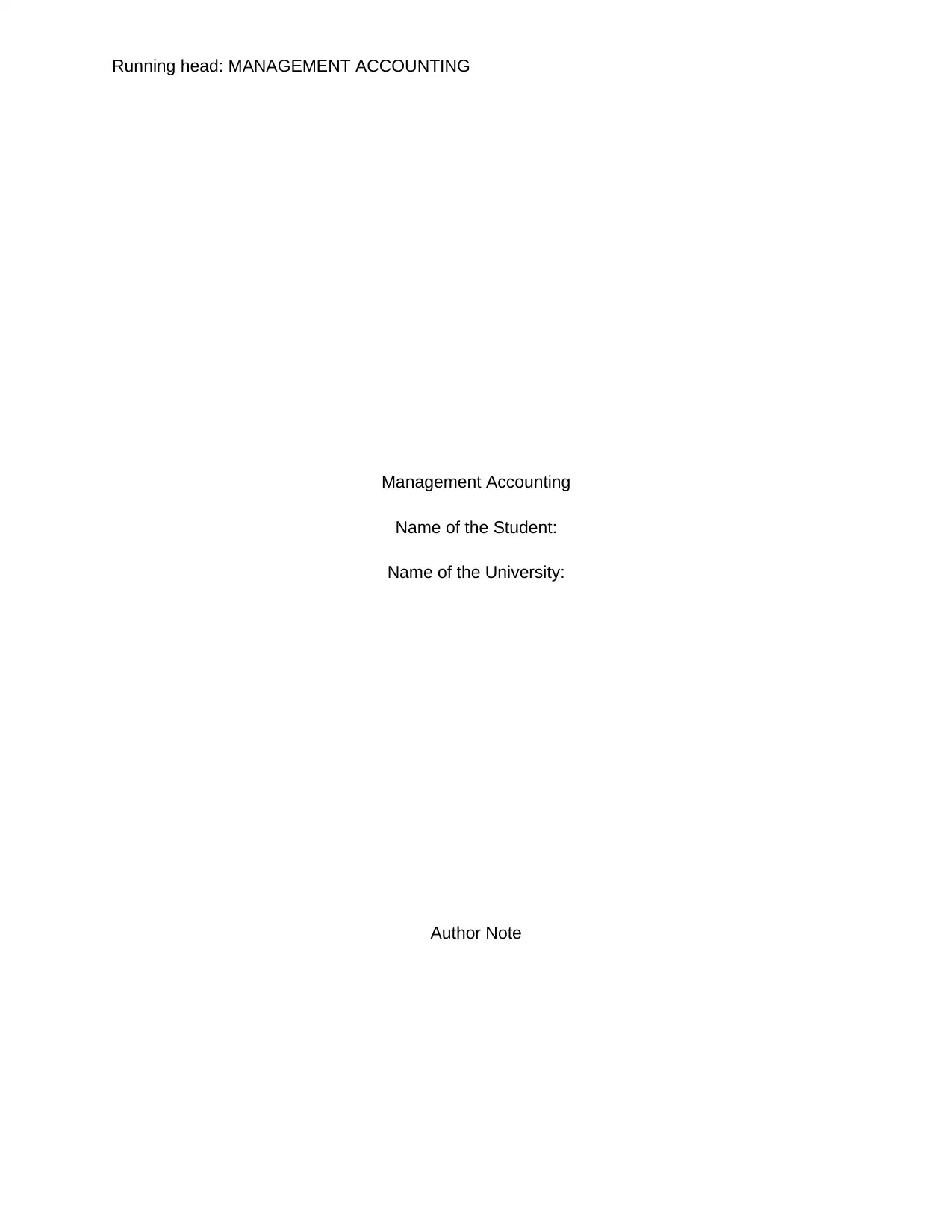
Running head: MANAGEMENT ACCOUNTING
Management Accounting
Name of the Student:
Name of the University:
Author Note
Management Accounting
Name of the Student:
Name of the University:
Author Note
Paraphrase This Document
Need a fresh take? Get an instant paraphrase of this document with our AI Paraphraser
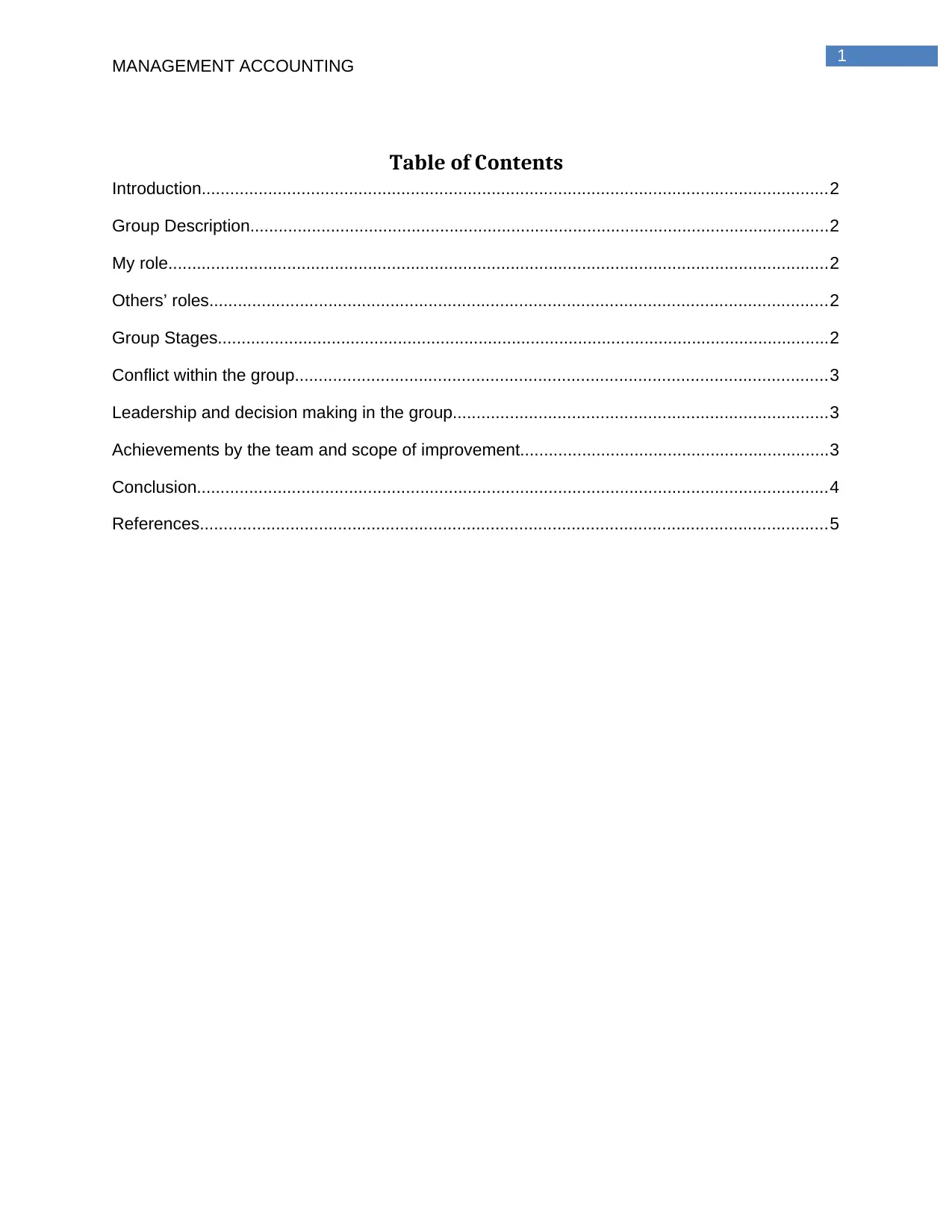
1
MANAGEMENT ACCOUNTING
Table of Contents
Introduction....................................................................................................................................2
Group Description..........................................................................................................................2
My role...........................................................................................................................................2
Others’ roles..................................................................................................................................2
Group Stages.................................................................................................................................2
Conflict within the group................................................................................................................3
Leadership and decision making in the group...............................................................................3
Achievements by the team and scope of improvement.................................................................3
Conclusion.....................................................................................................................................4
References....................................................................................................................................5
MANAGEMENT ACCOUNTING
Table of Contents
Introduction....................................................................................................................................2
Group Description..........................................................................................................................2
My role...........................................................................................................................................2
Others’ roles..................................................................................................................................2
Group Stages.................................................................................................................................2
Conflict within the group................................................................................................................3
Leadership and decision making in the group...............................................................................3
Achievements by the team and scope of improvement.................................................................3
Conclusion.....................................................................................................................................4
References....................................................................................................................................5
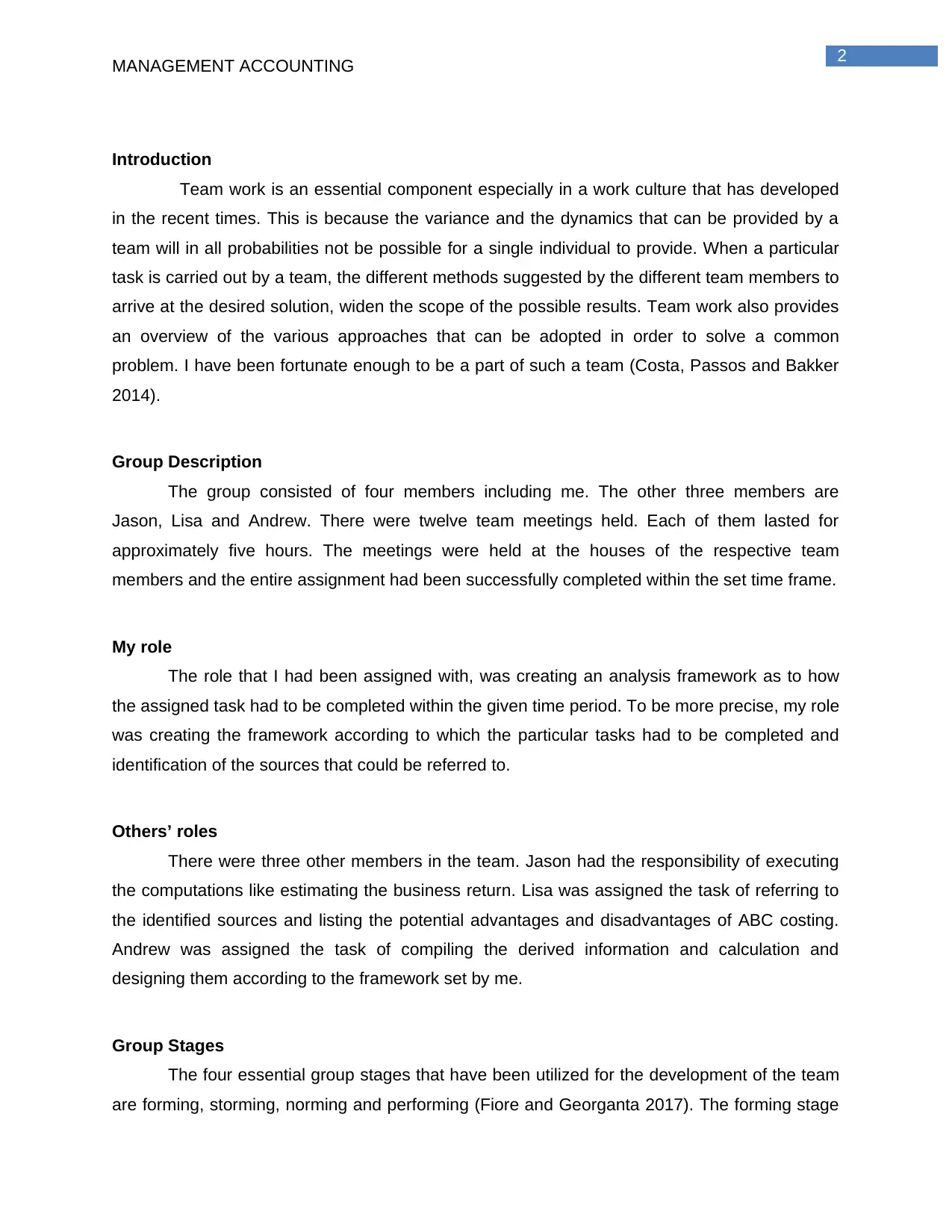
2
MANAGEMENT ACCOUNTING
Introduction
Team work is an essential component especially in a work culture that has developed
in the recent times. This is because the variance and the dynamics that can be provided by a
team will in all probabilities not be possible for a single individual to provide. When a particular
task is carried out by a team, the different methods suggested by the different team members to
arrive at the desired solution, widen the scope of the possible results. Team work also provides
an overview of the various approaches that can be adopted in order to solve a common
problem. I have been fortunate enough to be a part of such a team (Costa, Passos and Bakker
2014).
Group Description
The group consisted of four members including me. The other three members are
Jason, Lisa and Andrew. There were twelve team meetings held. Each of them lasted for
approximately five hours. The meetings were held at the houses of the respective team
members and the entire assignment had been successfully completed within the set time frame.
My role
The role that I had been assigned with, was creating an analysis framework as to how
the assigned task had to be completed within the given time period. To be more precise, my role
was creating the framework according to which the particular tasks had to be completed and
identification of the sources that could be referred to.
Others’ roles
There were three other members in the team. Jason had the responsibility of executing
the computations like estimating the business return. Lisa was assigned the task of referring to
the identified sources and listing the potential advantages and disadvantages of ABC costing.
Andrew was assigned the task of compiling the derived information and calculation and
designing them according to the framework set by me.
Group Stages
The four essential group stages that have been utilized for the development of the team
are forming, storming, norming and performing (Fiore and Georganta 2017). The forming stage
MANAGEMENT ACCOUNTING
Introduction
Team work is an essential component especially in a work culture that has developed
in the recent times. This is because the variance and the dynamics that can be provided by a
team will in all probabilities not be possible for a single individual to provide. When a particular
task is carried out by a team, the different methods suggested by the different team members to
arrive at the desired solution, widen the scope of the possible results. Team work also provides
an overview of the various approaches that can be adopted in order to solve a common
problem. I have been fortunate enough to be a part of such a team (Costa, Passos and Bakker
2014).
Group Description
The group consisted of four members including me. The other three members are
Jason, Lisa and Andrew. There were twelve team meetings held. Each of them lasted for
approximately five hours. The meetings were held at the houses of the respective team
members and the entire assignment had been successfully completed within the set time frame.
My role
The role that I had been assigned with, was creating an analysis framework as to how
the assigned task had to be completed within the given time period. To be more precise, my role
was creating the framework according to which the particular tasks had to be completed and
identification of the sources that could be referred to.
Others’ roles
There were three other members in the team. Jason had the responsibility of executing
the computations like estimating the business return. Lisa was assigned the task of referring to
the identified sources and listing the potential advantages and disadvantages of ABC costing.
Andrew was assigned the task of compiling the derived information and calculation and
designing them according to the framework set by me.
Group Stages
The four essential group stages that have been utilized for the development of the team
are forming, storming, norming and performing (Fiore and Georganta 2017). The forming stage
⊘ This is a preview!⊘
Do you want full access?
Subscribe today to unlock all pages.

Trusted by 1+ million students worldwide
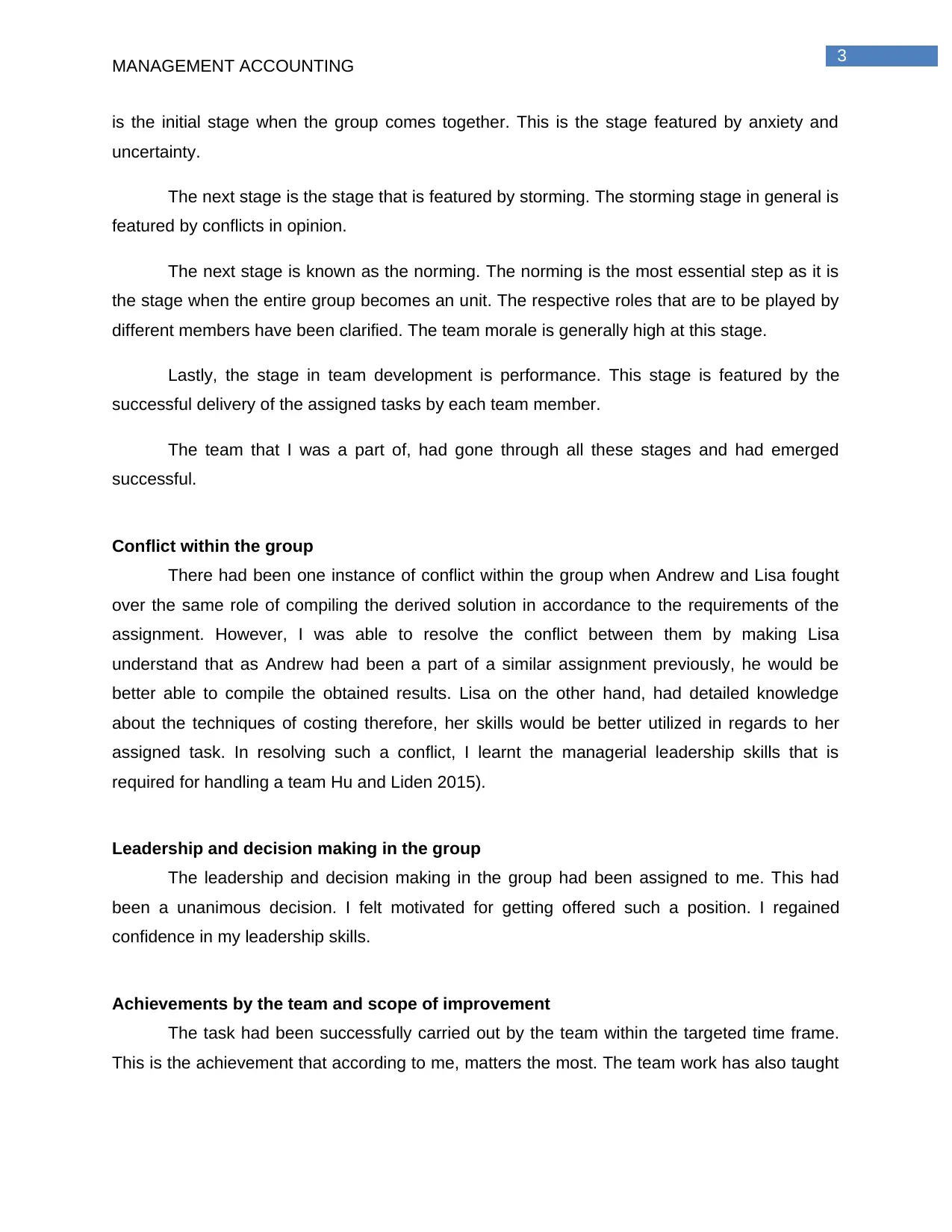
3
MANAGEMENT ACCOUNTING
is the initial stage when the group comes together. This is the stage featured by anxiety and
uncertainty.
The next stage is the stage that is featured by storming. The storming stage in general is
featured by conflicts in opinion.
The next stage is known as the norming. The norming is the most essential step as it is
the stage when the entire group becomes an unit. The respective roles that are to be played by
different members have been clarified. The team morale is generally high at this stage.
Lastly, the stage in team development is performance. This stage is featured by the
successful delivery of the assigned tasks by each team member.
The team that I was a part of, had gone through all these stages and had emerged
successful.
Conflict within the group
There had been one instance of conflict within the group when Andrew and Lisa fought
over the same role of compiling the derived solution in accordance to the requirements of the
assignment. However, I was able to resolve the conflict between them by making Lisa
understand that as Andrew had been a part of a similar assignment previously, he would be
better able to compile the obtained results. Lisa on the other hand, had detailed knowledge
about the techniques of costing therefore, her skills would be better utilized in regards to her
assigned task. In resolving such a conflict, I learnt the managerial leadership skills that is
required for handling a team Hu and Liden 2015).
Leadership and decision making in the group
The leadership and decision making in the group had been assigned to me. This had
been a unanimous decision. I felt motivated for getting offered such a position. I regained
confidence in my leadership skills.
Achievements by the team and scope of improvement
The task had been successfully carried out by the team within the targeted time frame.
This is the achievement that according to me, matters the most. The team work has also taught
MANAGEMENT ACCOUNTING
is the initial stage when the group comes together. This is the stage featured by anxiety and
uncertainty.
The next stage is the stage that is featured by storming. The storming stage in general is
featured by conflicts in opinion.
The next stage is known as the norming. The norming is the most essential step as it is
the stage when the entire group becomes an unit. The respective roles that are to be played by
different members have been clarified. The team morale is generally high at this stage.
Lastly, the stage in team development is performance. This stage is featured by the
successful delivery of the assigned tasks by each team member.
The team that I was a part of, had gone through all these stages and had emerged
successful.
Conflict within the group
There had been one instance of conflict within the group when Andrew and Lisa fought
over the same role of compiling the derived solution in accordance to the requirements of the
assignment. However, I was able to resolve the conflict between them by making Lisa
understand that as Andrew had been a part of a similar assignment previously, he would be
better able to compile the obtained results. Lisa on the other hand, had detailed knowledge
about the techniques of costing therefore, her skills would be better utilized in regards to her
assigned task. In resolving such a conflict, I learnt the managerial leadership skills that is
required for handling a team Hu and Liden 2015).
Leadership and decision making in the group
The leadership and decision making in the group had been assigned to me. This had
been a unanimous decision. I felt motivated for getting offered such a position. I regained
confidence in my leadership skills.
Achievements by the team and scope of improvement
The task had been successfully carried out by the team within the targeted time frame.
This is the achievement that according to me, matters the most. The team work has also taught
Paraphrase This Document
Need a fresh take? Get an instant paraphrase of this document with our AI Paraphraser
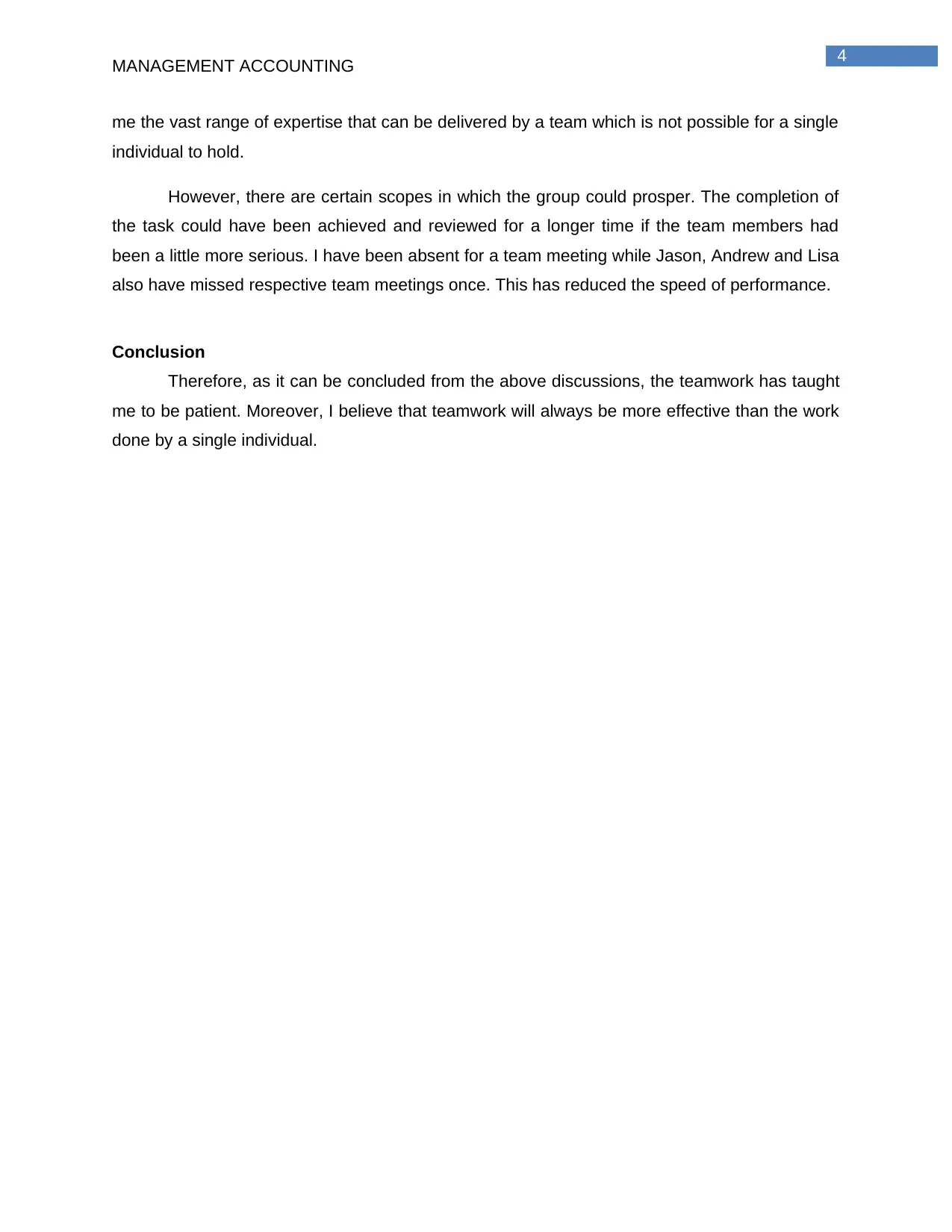
4
MANAGEMENT ACCOUNTING
me the vast range of expertise that can be delivered by a team which is not possible for a single
individual to hold.
However, there are certain scopes in which the group could prosper. The completion of
the task could have been achieved and reviewed for a longer time if the team members had
been a little more serious. I have been absent for a team meeting while Jason, Andrew and Lisa
also have missed respective team meetings once. This has reduced the speed of performance.
Conclusion
Therefore, as it can be concluded from the above discussions, the teamwork has taught
me to be patient. Moreover, I believe that teamwork will always be more effective than the work
done by a single individual.
MANAGEMENT ACCOUNTING
me the vast range of expertise that can be delivered by a team which is not possible for a single
individual to hold.
However, there are certain scopes in which the group could prosper. The completion of
the task could have been achieved and reviewed for a longer time if the team members had
been a little more serious. I have been absent for a team meeting while Jason, Andrew and Lisa
also have missed respective team meetings once. This has reduced the speed of performance.
Conclusion
Therefore, as it can be concluded from the above discussions, the teamwork has taught
me to be patient. Moreover, I believe that teamwork will always be more effective than the work
done by a single individual.
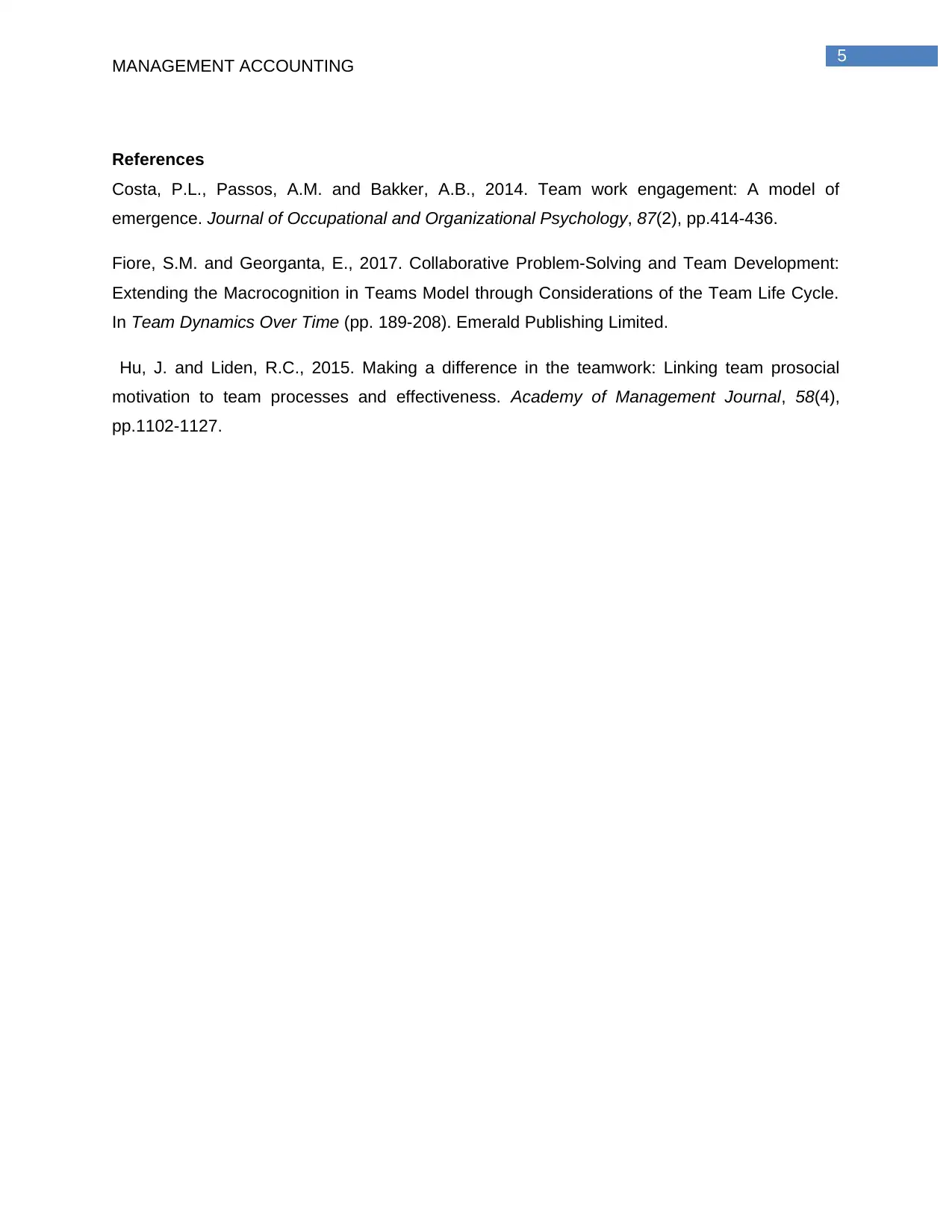
5
MANAGEMENT ACCOUNTING
References
Costa, P.L., Passos, A.M. and Bakker, A.B., 2014. Team work engagement: A model of
emergence. Journal of Occupational and Organizational Psychology, 87(2), pp.414-436.
Fiore, S.M. and Georganta, E., 2017. Collaborative Problem-Solving and Team Development:
Extending the Macrocognition in Teams Model through Considerations of the Team Life Cycle.
In Team Dynamics Over Time (pp. 189-208). Emerald Publishing Limited.
Hu, J. and Liden, R.C., 2015. Making a difference in the teamwork: Linking team prosocial
motivation to team processes and effectiveness. Academy of Management Journal, 58(4),
pp.1102-1127.
MANAGEMENT ACCOUNTING
References
Costa, P.L., Passos, A.M. and Bakker, A.B., 2014. Team work engagement: A model of
emergence. Journal of Occupational and Organizational Psychology, 87(2), pp.414-436.
Fiore, S.M. and Georganta, E., 2017. Collaborative Problem-Solving and Team Development:
Extending the Macrocognition in Teams Model through Considerations of the Team Life Cycle.
In Team Dynamics Over Time (pp. 189-208). Emerald Publishing Limited.
Hu, J. and Liden, R.C., 2015. Making a difference in the teamwork: Linking team prosocial
motivation to team processes and effectiveness. Academy of Management Journal, 58(4),
pp.1102-1127.
⊘ This is a preview!⊘
Do you want full access?
Subscribe today to unlock all pages.

Trusted by 1+ million students worldwide
1 out of 6
Related Documents
Your All-in-One AI-Powered Toolkit for Academic Success.
+13062052269
info@desklib.com
Available 24*7 on WhatsApp / Email
![[object Object]](/_next/static/media/star-bottom.7253800d.svg)
Unlock your academic potential
Copyright © 2020–2026 A2Z Services. All Rights Reserved. Developed and managed by ZUCOL.





